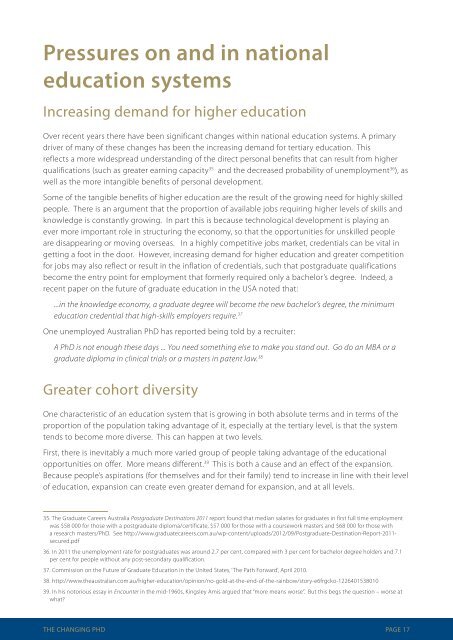the-changing-phd_final
the-changing-phd_final
the-changing-phd_final
You also want an ePaper? Increase the reach of your titles
YUMPU automatically turns print PDFs into web optimized ePapers that Google loves.
Pressures on and in national<br />
education systems<br />
Increasing demand for higher education<br />
Over recent years <strong>the</strong>re have been significant changes within national education systems. A primary<br />
driver of many of <strong>the</strong>se changes has been <strong>the</strong> increasing demand for tertiary education. This<br />
reflects a more widespread understanding of <strong>the</strong> direct personal benefits that can result from higher<br />
qualifications (such as greater earning capacity 35 and <strong>the</strong> decreased probability of unemployment 36 ), as<br />
well as <strong>the</strong> more intangible benefits of personal development.<br />
Some of <strong>the</strong> tangible benefits of higher education are <strong>the</strong> result of <strong>the</strong> growing need for highly skilled<br />
people. There is an argument that <strong>the</strong> proportion of available jobs requiring higher levels of skills and<br />
knowledge is constantly growing. In part this is because technological development is playing an<br />
ever more important role in structuring <strong>the</strong> economy, so that <strong>the</strong> opportunities for unskilled people<br />
are disappearing or moving overseas. In a highly competitive jobs market, credentials can be vital in<br />
getting a foot in <strong>the</strong> door. However, increasing demand for higher education and greater competition<br />
for jobs may also reflect or result in <strong>the</strong> inflation of credentials, such that postgraduate qualifications<br />
become <strong>the</strong> entry point for employment that formerly required only a bachelor’s degree. Indeed, a<br />
recent paper on <strong>the</strong> future of graduate education in <strong>the</strong> USA noted that:<br />
...in <strong>the</strong> knowledge economy, a graduate degree will become <strong>the</strong> new bachelor’s degree, <strong>the</strong> minimum<br />
education credential that high-skills employers require. 37<br />
One unemployed Australian PhD has reported being told by a recruiter:<br />
A PhD is not enough <strong>the</strong>se days ... You need something else to make you stand out. Go do an MBA or a<br />
graduate diploma in clinical trials or a masters in patent law. 38<br />
Greater cohort diversity<br />
One characteristic of an education system that is growing in both absolute terms and in terms of <strong>the</strong><br />
proportion of <strong>the</strong> population taking advantage of it, especially at <strong>the</strong> tertiary level, is that <strong>the</strong> system<br />
tends to become more diverse. This can happen at two levels.<br />
First, <strong>the</strong>re is inevitably a much more varied group of people taking advantage of <strong>the</strong> educational<br />
opportunities on offer. More means different. 39 This is both a cause and an effect of <strong>the</strong> expansion.<br />
Because people’s aspirations (for <strong>the</strong>mselves and for <strong>the</strong>ir family) tend to increase in line with <strong>the</strong>ir level<br />
of education, expansion can create even greater demand for expansion, and at all levels.<br />
35. The Graduate Careers Australia Postgraduate Destinations 2011 report found that median salaries for graduates in first full time employment<br />
was $58 000 for those with a postgraduate diploma/certificate, $57 000 for those with a coursework masters and $68 000 for those with<br />
a research masters/PhD. See http://www.graduatecareers.com.au/wp-content/uploads/2012/09/Postgraduate-Destination-Report-2011-<br />
secured.pdf<br />
36. In 2011 <strong>the</strong> unemployment rate for postgraduates was around 2.7 per cent, compared with 3 per cent for bachelor degree holders and 7.1<br />
per cent for people without any post-secondary qualification.<br />
37. Commission on <strong>the</strong> Future of Graduate Education in <strong>the</strong> United States, ‘The Path Forward’, April 2010.<br />
38. http://www.<strong>the</strong>australian.com.au/higher-education/opinion/no-gold-at-<strong>the</strong>-end-of-<strong>the</strong>-rainbow/story-e6frgcko-1226401538010<br />
39. In his notorious essay in Encounter in <strong>the</strong> mid-1960s, Kingsley Amis argued that “more means worse”. But this begs <strong>the</strong> question – worse at<br />
what?<br />
THE CHANGING PHD PAGE 17


